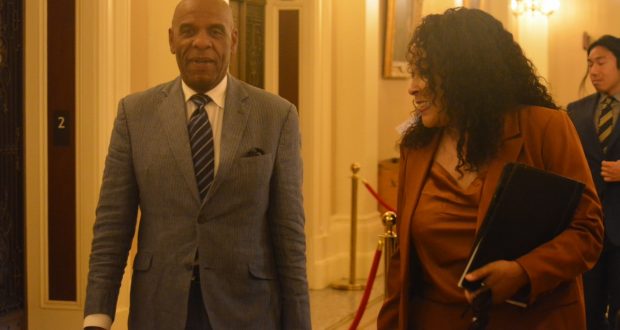By Antonio? ?Ray? ?Harvey? ?|? ?California? ?Black? ?Media
Three reparations bills authored by Sen. Steven Bradford (D-Inglewood) passed out of the Assembly Appropriations Committee on Aug. 15.
Senate Bill (SB) 1403, SB 1050, and SB 1331 are now on their way to the Assembly floor for a full vote. If approved, the bills would advance to Gov. Gavin Newsom’s desk for his signature or veto.
“I want to thank the committee for seeing the importance of these measures,” Bradford said. “I think it speaks to the fact that reparations is an issue that still needs to be addressed. We still experience institutional racism and discrimination in this country.”
SB 1331 proposes creating an account in the state treasury to fund reparations policies approved by the Legislature and the Governor.
SB 1050 would offer compensation to Black Californians who are descendants of enslaved people who lost homes or had their land taken without fair compensation as a result of racially motivated misuse of eminent domain.
SB 1403 establishes the framework for establishing the California American Freedmen Affairs Agency (CAFAA), a state-level department that would oversee all reparations activities, including validating individuals’ status as a descendant of an enslaved person in the United States.
Assemblymember Buffy Wicks (D-Oakland), Chair of the Assembly Appropriations Committee, said it was critical that the reparations bills moved out of the “suspense file,” a designation for bills estimated to cost over $150,000 to implement.
“We moved forward with all the reparations bills. I think this is obviously a huge issue not just for our state but our country,” Wicks said. “It’s about time we have real-direct public policy conversations about it. It was important to move them through the committees so that we can have that conversation.”
In its final 1,075-page report submitted to the legislature in June 2023, the California Reparations Task Force to Study and Develop Reparation Proposals for African Americans made 115 recommendations to compensate African Americans for harms experienced as a result of slavery.
One of the recommendations is for the state to issue a formal apology to the descendants of people enslaved in the United States. Assembly Bill (AB) 3089, authored by Assemblymember Reggie Jones-Sawyer (D-Los Angeles), would require the state to make that statement.
It passed out of the Senate Appropriations Committee with a 5-0 vote and is the fourth reparations bill advanced by the Legislature. Senate minority leader Brian Jones (R-San Diego) and Sen. Kelly Seyarto (R-Murrieta), abstained from voting.
Chris Lodgson, a member of the Coalition for a Just and Equitable California (CJEC), a Sacramento-based reparations advocacy organization, attended the Assembly Appropriation Committee’s suspense file hearing.
“Our ancestors have been with us every step of the way,” Lodgson said. “But there is still more work to do. We must get the (current) bills off the floor in the next two weeks. Make no mistake about it, we would not have those opportunities for the next fights if we did not win today.”
Dawn Paige of Concerned Black Citizens, Inc., flew in from North Carolina to be present at State Capitol Annex Swing Space to witness the passage of the bills. She sat with members of CJEC and other reparations advocates.
Paige traced her lineage back to 1721 in Virginia and 1830 in South and North Carolina. She trains and educates organizers and communities on how to advocate effectively reparations policy at the state and federal levels.
Reflecting on California’s significant role in creating a reparations blueprint for the rest of the country, Paige told California Black Media (CBM), “I came to see history. We’ve been working so hard, so long on this, and fought so hard that it’s actually yielding results in our favor. We are winning. There is no question that North Carolina was a slave and Jim Crow state, but to have the state with the fifth largest economy in the world pushing these legislations through and ultimately funding them is a big stamp of approval.”
Paige added, “It says that this can actually be implemented and that we can take this template and fit it into other states. That’s what I’ll be pushing in my organizing circle.”
Bradford, who terms out of the Legislature in November after serving in the Assembly and Senate, hopes the bills and other reparations legislation pushed by the California Legislative Black Caucus (CLBC) set the standards for other states.
This year, Newsom added $12 million to the 2024-2025 budget to support reparations legislation.
“This is not a handout. This is what was promised to us 163 years ago and it’s long overdue,” Bradford said. “I hope it sends a signal not only for California but for the rest of the nation that this is a priority. Not only is California watching. The nation is watching.”
 Westside Story Newspaper – Online The News of The Empire – Sharing the Quest for Excellence
Westside Story Newspaper – Online The News of The Empire – Sharing the Quest for Excellence




